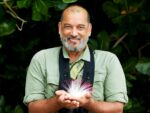Why you should consider bathing in the morning dew in Malaysia
You’ve heard of Japan’s shinrin-yoku, but have you heard of Malaysia’s Mandi Embun?
BY CHARUKESI RAMADURAI
14 July 2022
The green slopes of Gunung Mat Cincang rise up in front of me, enveloped in a blanket of mist and clouds. Pronounced Matchinchang and located in the Malaysian island of Langkawi, it is the oldest mountain range in southeast Asia, believed to have been formed over 550 million years ago. But this UNESCO World Heritage Geopark is not the only ancient thing in these parts; the dense rainforest sprawling across this island are over 10 million years old themselves.
Forest bathing in Malaysia
On a balmy April morning, I wake at the crack of dawn to take a walk in a small patch of this rainforest, close to The Datai, the luxury resort where I am staying. My guide for the hike is Irshad Mobarak, one of Malaysia’s most respected conservation experts, and hotel’s resident naturalist.
A few decades ago, the Japanese introduced the world to shinrin-yoku, or forest bathing, as an antidote to the incessant stress of the modern world. Over the years, robust scientific research has proven that spending time in nature provides innumerable health benefits, from improved mood to enhanced creativity, better sleep and sharper cognitive abilities. What we are doing here is the much older Malaysian version called Mandi Embun, that roughly translates to ‘bathing in the morning dew.’
Why you should consider bathing in the morning dew in Malaysia
On this Mandi Embun walk, my husband and I are the only guests. This is par for the course, since it is offered only as a private experience for the resort’s resident guests. My only prior forest bathing experience, if it can be called that, was among the towering redwoods of California; an easy breezy walk among giants. But here in Langkawi, under the occasionally opaque rainforest canopy, the experience is intensive and immersive, demanding that I fully use all my senses. And breathing in the sultry island air, I feel alive in a way that city life never makes me feel.
On the way, Irshad explains that these primary lowland forests contain several types of endemic flora and fauna, existing in a complex ecosystem. Apart from birds such as the striking yellow-hued black-headed oriole, this region is also home to a few fascinatingly unique fauna, such as the slow loris and the colugo (known as the flying lemur). At this time of the day, we don’t see any animal activity, but the birdsong is at a crescendo, teasing us all the way.
Irshad also points to specific examples of the way Malay people have traditionally used resources from the forest as medicine and food. For instance, the berries from a Melastoma plant (Senduduk) laden with pink flowers act as a remedy for indigestion and flatulence. As I listen to his stories, I am distracted by the sights and sounds of the lush forest. Not just the steady low buzz of the cicadas, but also the whooshing sound of the great hornbill and the gentle babble of a jungle brook, the heady fragrance of wild flowers and the crisp crackling of dry leaves beneath our feet.
Why you should consider bathing in the morning dew in Malaysia
The leisurely walk comes to an end at a wooden platform at the edge of a clear stream, a private lounge created by the resort. A couple of wellness therapists from the resort are waiting there with a yoga mat, to take me through a short session of deep breathing and gentle stretching in a Malay practice called Senaman Tua. It is then time for a cooling dip in the stream. I learn only later that this is also part of a healing ritual called Mandi Maul Hayat ritual, that means ‘bathing in the water of life.’ Before we head back to the resort, there is a mini feast of fruit and nuts, that I wash down with green tea.
After a breakfast of roti jala—Malay crepes that look like delicate lace doilies—with a side of fragrant curry, it is spa time. I indulge in a Seven Spices body scrub, followed by a Four Hands massage. The spa is an airy, large space with private treatment villas and an open waiting area, situated by a winding stream. Under the soothing hands of the massage therapists and a background score of chirping insects, I am lulled into somnolence.
Why you should consider bathing in the morning dew in Malaysia
As it happens, even without the hike, there is ample opportunity to practice Mandi Embun within the gates of the property itself, given that its location in the middle of the rainforest, ringed by the Andaman Sea. Take your pick of nature activities at the resort: from an afternoon stroll through the butterfly garden or a night walk to spot Sunda flying lemurs and elusive mouse deer, to a dolphin spotting cruise on the sea or a kayak ride through dense mangroves. Alternatively, just sit with a tall drink at the beachside bar and wait for otters to emerge on to the sand, or borrow a pair of binoculars for some birdwatching from the comfort of your own room.
 Next Post
Next Post







